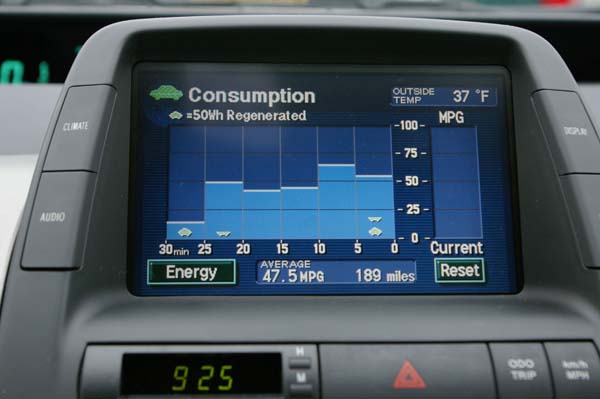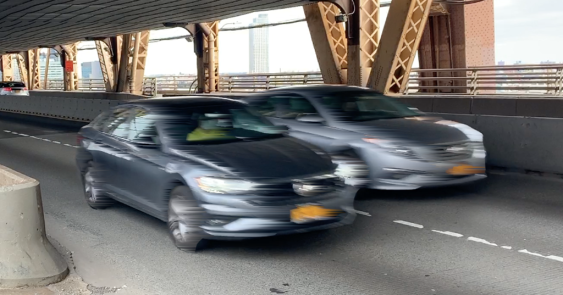How to Get People to Adopt More Climate-Friendly Behaviors
11:35 AM EDT on April 29, 2011
Dear sustainability advocate: I know you are tired.
You spend your life looking climate apocalypse in the eye and knowing that human behavior needs to change to avert catastrophe. But are humans changing their behavior? Not fast enough.
And why not? You’ve started carpooling and weatherized your house and it wasn't so hard. So why don’t your neighbors get it? Why aren’t they doing anything?

These questions have unleashed a new field of climate change-related behavioral science. I write now from its epicenter: the Garrison Institute symposium on Climate, Cities and Behavior in New York's Hudson Valley. The idea is to figure out what mental processes are at work when people decide to change something in their own lives for the greater good – specifically, for the environment. After all, cities can set emissions reductions targets all they want but they need people to actually reduce their emissions to meet their goals. And no one can force your neighbors to turn off their air conditioners. They’ll have to make that decision themselves.
Here are some strategies, from the behavioral scientists to you:
Attitudes follow behavior, not the other way around.
Here’s what we wish would happen: Joe Schmo stumbles upon a brilliantly researched and written article in, oh I don’t know, Streetsblog, for example, that convinces him that climate change is real and dangerous and that he needs to do something. So he ditches his car and starts riding a bike to work. That’s an unlikely scenario, sadly. Maybe it’s because people get defensive when their lifestyle is criticized before they’re ready to give it up. Anyway, the more likely scenario is that Joe Schmo already rides a bike, maybe for exercise, maybe because he lives in a compact city that doesn’t require a car. When someone comes around trying to gather support for green cities, he gets on board – he already feels like he’s got skin in that game.
People aren’t scared enough yet by climate change.
We’re wired to feel real fear and urgency around threats that are present right now. Though the effects of climate change are being felt already all around us, from extreme weather to damaged crops, it still lacks the urgency needed to catalyze immediate and dramatic action.
When people do get scared, they get overwhelmed.
Once they do comprehend the magnitude of the crisis, people often feel the problem is too big and they’re too powerless, and anything they do will be a drop in the ocean, so why bother? Advocates have been able to turn this around by focusing on local climate initiatives with achievable goals that will impact public health and the environment at the local level -- and will give those feeling powerless a sense that they have, indeed, made a difference.
People only want to make a change if they stand to lose something.
You can tell people they’d save $774 a month by taking transit instead of driving and they’ll be unmoved. But if you tell people they’re losing $774 a month by driving instead of taking transit, they’ll pay attention. Home energy auditors won’t just tell you that your home could be more efficient, they’ll tell you the leaks in your walls are like having a basketball-shaped hole in the side of your house where cold air comes in (and money goes out).
People cling to the status quo.
You know this already. They complain about changes to their street infrastructure when cities put in bike lanes and other safety measures that might slow traffic down or repurpose parking spaces. Elke Weber of Columbia Business School said there was initially huge public opposition to indoor smoking bans in New York and elsewhere, but people quickly grew to appreciate the bans once they were in place – and were the new “status quo.” There’s also something known as “query theory,” which says that people tend to generate more arguments in favor of the first option put before them – the way the top name on the ballot gets an unfair advantage – and the status quo is always the first thing.
People go along with the default option.
This dovetails with the love of the status quo, of course, but it goes beyond that. Weber said that when people registering for a drivers license have to check a box saying that yes, they want to be an organ donor, about 70 percent opt in. But if the default is that you’re an organ donor unless you check a box saying you opt out, the organ donor rate rises to 93 percent. So if the standard apartment comes with its own parking space, with the price included, it makes it easy for people to have a car. But if someone needs to pay separately for the space and he feels the cost, he’s more likely to decide having a car is a hassle.
Pick your venue carefully.
Studies show that people vote differently if the polling place is a public school or a church. The two venues activate very different values. In Las Vegas, where casinos are sometimes used as polling places, voters are surrounded by images and symbols of risk, self-interest, and materialism, and those are the values they’ll more likely vote for. Behavior also changes depending on whether people are making decisions in a group or alone. In a group, they’re reminded that their actions have an impact on others, and they’re reassured that they’re not the only ones deciding to make a personal sacrifice for the greater good. They’d feel like a sucker if they were the only one – but if the whole group is doing it, they feel like part of a team.

Be careful with buzzwords.
Studies found that people reacted much more favorably to the idea of carbon offsets than carbon taxes. While about 60 percent of people agreed to pay for a carbon offset when buying a plane ticket, the number dropped precipitously, especially among Republicans, when asked to contribute a voluntary tax. And perhaps if the offset fee were included in the price and consumers had to opt out of paying it, payment rates would go up.
Give people goals.
People love competing, even with themselves. Weber calls them “mental accounts” – personal carbon footprint calculators or smart metering technology that gives you a smiley face when it’s a good time to do the laundry. Fuel efficiency displays on hybrid cars make drivers positively obsessed with maximizing their efficiency – it almost becomes a video game (which they play, unfortunately, while they’re driving, creating its own set of hazards). Many urban sustainability directors spoke at the Garrison program about their own efforts to reduce their cities’ carbon footprints by encouraging more efficient behavior among the businesses and residents of their cities, and many of them spoke to the effectiveness of certification programs that help people set and achieve goals. They also said that it becomes a game, with people reaching to get those last ten points to get their certification.
Peer pressure is your friend.
If your friends jumped off the Brooklyn Bridge, would you? Of course not. But if they’re all zipping around town on their bikes and you’re dragging your beast of a car around with you, you might start re-thinking your choices. Even more persuasive, perhaps, is if the people you wish were your friends are zipping around on bikes. Weber said that when people know that the majority of their peers feel a certain way, they’re heavily swayed in that direction.
I’d add to that my own belief that the best way to get people to make a change is to show them that by making that change, they’ll be part of a community they want to be a part of – whether an actual group or an identity. If they think the community of the car-free is all losers who never got their drivers license, they won’t want to join that community. If they think the car-free are hip, independent urbanites with active lifestyles, they’ll be more likely to consider it – but that’s not an identity that works for everyone either. Maybe you think riding to work in spandex and an aggressive stance on your racing bike is awesome, but lots of people aren’t going to feel comfortable until they see other people in work clothes riding around in upright cruisers with a basket on the front.
People like to be told what to do.
They hate rules, laws and regulations trying to control their behavior – that’s the fastest way to get on a libertarian’s bad side – but they like having people they respect make clear what’s expected of them. It’s more effective than showing them data to convince them of the rationality of your position or trying to scare them into acting to avert climate disaster. It’s the "What Would Jesus Do" method, says Weber – or what would the Green Party do, if that’s a more apt model – or what would Angelina do? It needs to be concrete and be modeled by someone they respect.
These aren’t tricks for social engineering – they’re not much more than marketing tools. Effective political movement leaders and Madison Avenue have known these things for decades. They’re useful tools for sustainability advocates and transportation reformers to deploy too, in being more effective communicators with people. And to make the changes we need to make for the sake of our cities and our planet, we’ll need to be a lot more effective and change a lot more minds – and behaviors.
Stay in touch
Sign up for our free newsletter
More from Streetsblog USA
Thursday’s Headlines Are Down on Highways
Two outlets recently featured articles on the harmful effects of ongoing freeway projects.
Talking Headways Podcast: Details of Development Reform in Minnesota, Part I
Jim Kumon of Electric Housing discusses his work as a developer and urban policy educator in the Twin Cities.
Thursday’s Headlines Don’t Like Riding on the Passenger Side
Can you take me to the store, and then the bank? I've got five dollars you can put in the tank.
Study: When Speed Limits Rise on Interstates, So Do Crash Hot Spots on Nearby Roads
Rising interstate speeds don't just make roads deadlier for people who drive on them — and local decision makers need to be prepared.
Calif. Bill to Require Speed Control in Vehicles Goes Limp
Also passed yesterday were S.B 961, the Complete Streets bill, a bill on Bay Area transit funding, and a prohibition on state funding for Class III bikeways.




